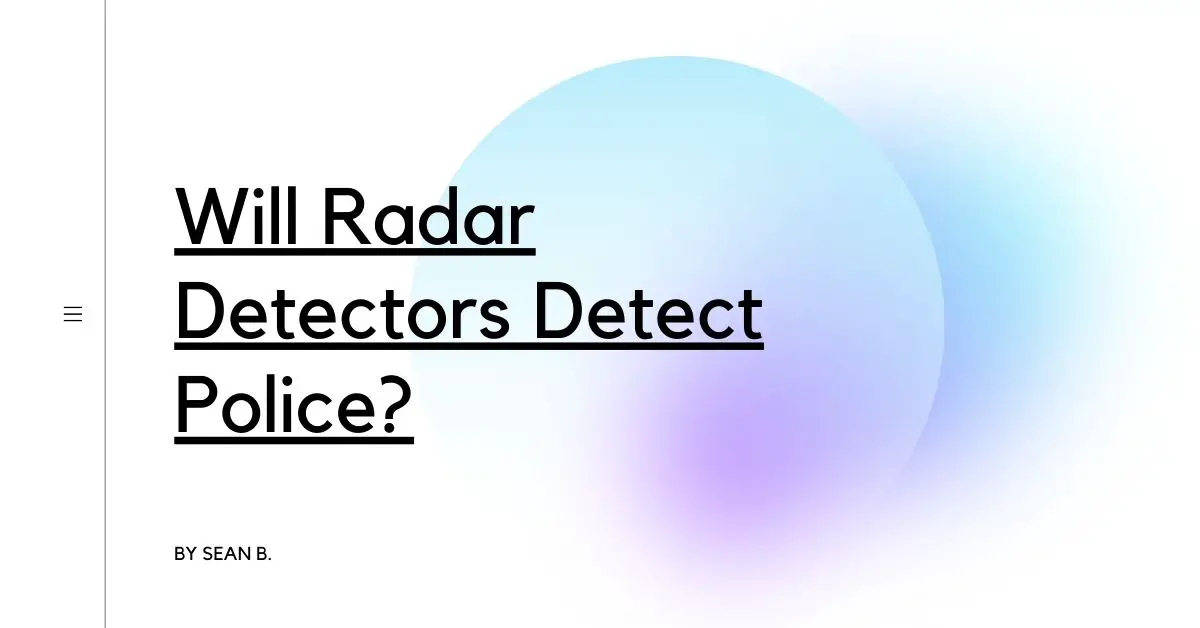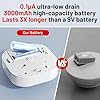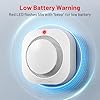Radar detectors can be a useful tool for drivers who want to avoid getting speeding tickets. But do they actually work? Do they help drivers avoid being pulled over by the police?
The answer is yes and no. Radar detectors can help drivers avoid speeding tickets, but they will not necessarily help drivers avoid being pulled over by police. Radar detectors can detect the presence of police radar, but they cannot always tell when police are actually using the radar.
Some radar detectors come with features that can help drivers avoid being pulled over by police. For example, some radar detectors can alert drivers when there is a police car nearby. Other radar detectors can provide information about the location of speed cameras.
However, the best way to avoid being pulled over by the police is to drive safely and obey the speed limit. Radar detectors can be a helpful tool, but they are not a guarantee that you will never be pulled over by police.
Contents
How radar detectors can help you avoid getting speeding tickets?
Radar detectors can help you avoid getting speeding tickets by alerting you to the presence of speed-monitoring devices in the area. Radar detectors work by detecting the radio waves emitted by these devices and then sounding an alarm to warn you that you are approaching one. This gives you time to slow down and avoid getting a ticket.
How police can detect radar detectors?
Police can detect radar detectors by using a device called a radar detector. This device emits a signal that can be detected by radar detectors, causing them to sound an alarm. This lets the police know that a driver is using a radar detector and may be trying to speed.
How to avoid getting caught with a radar detector?
There are a few ways to avoid getting caught with a radar detector. One is to make sure that your detector is not visible to the police. Another is to keep your speed within the posted limit so that you are not flagged as a speeding driver. Finally, you can turn off your detector when you are not using it.
The different types of radar detectors and how they work
Radar detectors come in a few different types, each with its own strengths and weaknesses. The most common type is the handheld radar detector, which is small and portable but has a limited range. The other common type is the installed radar detector, which is more expensive but has a much longer range.
The most important factor in whether or not a radar detector will detect police is the type of radar being used. There are two main types of radar: instant-on and pulse. Instant-on radar is the most common type used by police, and it is very difficult to detect with a radar detector. Pulse radar is much less common, and it is much easier to detect.
Most radar detectors will detect both instant-on and pulse radar, but the range will vary depending on the type of radar and the quality of the detector. The best radar detectors will have a long-range and be able to detect both types of radar. However, even the best radar detectors can be fooled by instant-on radar if the police are using a very powerful radar gun.
How to choose the right radar detector for your needs?
Radar detectors are electronic devices that are used to detect the presence of radar guns that are used by police to measure the speed of vehicles. There are a variety of radar detectors on the market, and each has its own set of features and benefits. When choosing a radar detector, it is important to consider your specific needs and the features that are most important to you.
Some radar detectors come with GPS capabilities, which can be used to track the location of police radar guns and to provide warnings for upcoming speed traps. Other radar detectors come with laser sensors, which can detect the presence of laser guns that are used by police to target individual vehicles.
Some radar detectors come with features that make them easier to use, such as voice alerts that tell you the location of the nearest police radar gun. Other radar detectors come with more advanced features, such as the ability to connect to a smartphone or other device to provide real-time alerts.
When choosing a radar detector, it is important to consider the range of the device. Some radar detectors have a range of only a few miles, while others can detect police radar guns from much farther away. The range of the radar detector will determine how far in advance you will be able to detect the presence of a police radar gun.
It is also important to consider the price of the radar detector. Radar detectors can range in price from a few hundred dollars to several thousand dollars. The price of the radar detector will often depend on the features that are included.
Some radar detectors come with a subscription service that provides access to a database of police radar gun locations. This can be a helpful feature if you travel frequently or if you want to be able to avoid speed traps.
When choosing a radar detector, it is important to consider your specific needs and the features that are most important to you. There is a wide range of radar detectors on the market, and each has its own set of benefits. By taking the time to find the right radar detector for your needs, you can help to ensure that you are able to avoid costly speeding tickets.
The pros and cons of using a radar detector
Radar detectors are devices used to detect the presence of a radar gun, which is used by police officers to measure the speed of a vehicle. There are both pros and cons to using a radar detector. Some people believe that radar detectors give drivers a false sense of security and that they are more likely to speed if they have one. Others believe that radar detectors are a helpful tool that allows drivers to avoid getting speeding tickets.
There are a few different types of radar detectors available on the market. Some are more sophisticated than others, and some are more expensive. The most important thing to consider when choosing a radar detector is its range. The best radar detectors have a long-range, so they can pick up the signal from the radar gun before the driver is within range.
Radar detectors can be a helpful tool for drivers who want to avoid getting speeding tickets. However, they are not perfect, and they should not be relied upon as the sole method of avoiding a ticket. Drivers should always obey the posted speed limit and use other defensive driving techniques, such as keeping a safe following distance, to help avoid getting pulled over.
How to use a radar detector effectively?
Radar detectors are electronic devices that are used to detect the presence of radar guns that are used by police officers to measure the speed of a vehicle. Radar detectors are legal in most states, but there are some states where they are illegal. There are also some states where radar detectors are legal, but there are some restrictions on where they can be used.
Radar detectors work by detecting the radio waves that are emitted by radar guns. When a radar gun is turned on, it emits a radio wave that is picked up by the radar detector. The radar detector then alerts the driver that there is a radar gun in the area.
Most radar detectors will have a range of about a mile. This means that the radar detector will pick up the signal from the radar gun when the police officer is about a mile away from the vehicle.
There are a few things that drivers can do to make sure that their radar detectors are working properly. First, they should make sure that the batteries in their radar detectors are fresh. Second, they should make sure that the radar detector is properly mounted on the vehicle. Third, they should make sure that the radar detector is set to the correct sensitivity.
Most radar detectors will have a manual that will explain how to properly use the device. If a driver is not sure how to use their radar detector, they should consult the manual.
The best way to use a radar detector is to keep it turned on at all times. This way, the driver will be alerted to the presence of a radar gun as soon as it is turned on.
Some radar detectors come with a feature that will automatically turn off the radar detector when the vehicle is turned off. This is a good feature to have because it will prevent the radar detector from being left on and draining the battery.
When a radar detector is turned on, the driver should scan the horizon for police cars. If a police car is spotted, the driver should slow down and turn off the radar detector.
Once the police car has passed, the driver can turn the radar detector back on and continue to scan the horizon.
It is important to note that radar detectors will not pick up every police radar gun. In some cases, the police officer may be using a radar gun that is not detectable by the radar detector.
In other cases, the police officer may be using a radar gun that is not turned on. In these cases, the driver will not be able to detect the police radar gun and will not be able to slow down in time.
There are a few things that drivers can do to help their radar detectors work better.
- They should make sure that the radar detector is properly mounted on the vehicle.
- They should make sure that the radar detector is set to the correct sensitivity.
- They should make sure that the batteries in their radar detectors are fresh.
- They should make sure that the radar detector is turned on at all times.
- They should make sure that the radar detector is properly scanning the horizon for police cars.
- They should make sure that the radar detector is turned off when the vehicle is turned off.
- They should make sure that the radar detector is not left on and draining the battery.
- They should make sure that the radar detector is not set to the highest sensitivity setting.
- They should make sure that the radar detector is not turned on when there are no police cars in the area.
- They should make sure that the radar detector is turned off when the vehicle is turned off.
6. The myths and facts about radar detectors
Radar detectors have been around for decades, and there are a lot of myths and misinformation about them. Let’s set the record straight about radar detectors and their ability to detect police radar.
Myth #1: Radar detectors are illegal
Radar detectors are not illegal in the United States. However, there are some states and localities where their use is restricted. For example, in Virginia, radar detectors are not allowed on certain highways, and in Washington, D.C., their use is prohibited entirely. Be sure to check the laws in your state and locality before using a radar detector.
Myth #2: Radar detectors don’t work
Radar detectors do work, but their effectiveness depends on a number of factors. The most important factor is the strength and frequency of the radar signal. Police radar guns emit signals at different frequencies, and some radar detectors are better at detecting certain frequencies than others. Additionally, the angle and direction of the radar signal can also affect a radar detector’s ability to pick it up.
Myth #3: Radar detectors will always alert you to police radar
Radar detectors will not always alert you to police radar. In some cases, the police may be using a radar signal that is outside of the frequency range that your radar detector is able to pick up. Additionally, police may be using a radar signal that is obscured by buildings or other objects, which can make it more difficult for your radar detector to pick up.
Myth #4: Radar detectors are 100% accurate
Radar detectors are not 100% accurate. In some cases, they may give false alerts for things like automatic door openers or motion-activated lights. Additionally, some radar detectors may not be able to pick up all of the different frequencies that police radar guns use.
Myth #5: Radar detectors will make you drive faster
Radar detectors will not make you drive faster. They will only help you to avoid getting speeding tickets by alerting you to the presence of police radar.
Now that we’ve debunked some of the myths about radar detectors, let’s talk about how they can actually help you.
Radar detectors can be a valuable tool for avoiding speeding tickets. When used properly, they can help you to stay within the speed limit by alerting you to the presence of police radar. However, it’s important to remember that radar detectors are not 100% accurate, and they will not always alert you to police radar. Additionally, radar detectors are not a substitute for safe driving, and they will not make you drive faster.
7. The top radar detectors on the market
, like the Valentine One, can detect police radar from a relatively far distance. This is because these radar detectors have a few different antennas that can pick up on different frequencies. Most police officers use instant-on radar, which is a brief burst of radar that is very difficult for the average person to detect. However, the Valentine One has an arrow display that can help you determine which direction the instant-on radar is coming from, which can be very helpful.
Radar detectors are designed to pick up on the radio waves that are emitted by radar guns. Most radar guns operate on a frequency of 24.125 GHz, which is within the range that most radar detectors are designed to pick up on. However, there are some radar guns that operate on a different frequency, which may or may not be picked up by a radar detector. In general, the higher-end radar detectors on the market will be able to pick up on a wider range of frequencies, while the lower-end radar detectors may only be able to pick up on the most common frequency.
Some radar detectors also have the ability to pick up on laser signals. Laser signals are used by some police officers in order to target a specific vehicle. Laser signals are very difficult to detect, but some radar detectors have special sensors that can pick up on these signals.
In general, radar detectors can be a helpful tool for drivers who want to avoid getting speeding tickets. However, it is important to remember that radar detectors are not 100% accurate, and they can sometimes give false positives. Additionally, there are some police officers who are trained to spot drivers who are using radar detectors, and they may take enforcement action if they see a driver with a radar detector.
Summary
If you’re wondering whether or not your radar detector will pick up on police officers using radar to catch speeding drivers, the answer is yes! Radar detectors are designed to pick up on the radio waves that are emitted when police officers use radar guns, so you’ll be able to tell when they’re around. However, there are some limitations to what radar detectors can do. For example, they can’t always pick up on police officers who are using laser guns, and they also can’t always tell the difference between police officers and other sources of radio waves.



















